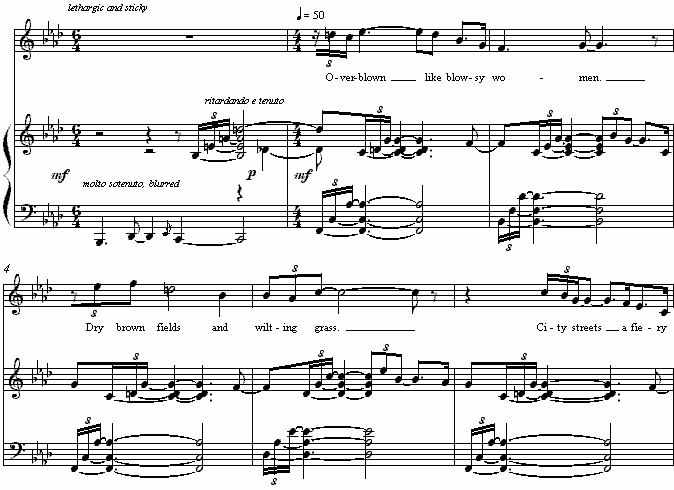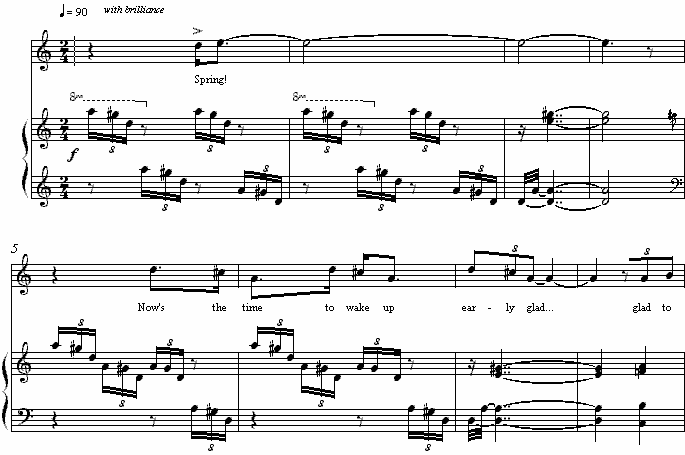Music and Texts of GARY BACHLUND
Vocal Music | Piano | Organ | Chamber Music | Orchestral | Articles and Commentary | Poems and Stories | Miscellany | FAQs
Four Seasons - (2005) Anton Gill
for high voice and piano
for Jonathan Barker
These texts remain under copyright and are therefore not fully reproduced herein.
i: Summer [ 4 pages, circa 3' 30" ]
Overblown like blowsy women.
Dry brown fields and wilting grass.
City streets a fiery cauldron.
Beaches baking....
ii: Autumn [ 5 pages, circa 2' 50" ]
Suddenly the air is cooler,
Gusts of wind blow leaves in circles;
Night comes early, lingers later,
No-one sits outside....
iii: Winter [ 5 pages, circa 2' 50" ]
Central heating steams the mirror,
Frost upon the window panes -
Outside, in the dirty alleys
Drifts the sullen snow....
iv: Spring [ 5 pages, circa 2' 35" ]
Now's the time to wake up early
Glad to see fresh buds on trees
And the dancers put their shoes on
To take up the dance....
Total [19 pages, circa 11' 35" ]
Born in 1948, Anton Gill was educated at Chigwell School and Clare College, Cambridge. Gill worked for the English Stage Company, the Arts Council of Great Britain, and the BBC before becoming a full-time writer in 1984. He is the author of many books, largely in the field of contemporary history, including The Journey Back from Hell: Conversations with Concentration Camp Survivors (winner of the H. H. Wingate Award), A Dance Between Flames: Berlin Between the Wars, and An Honourable Defeat: A History of the German Resistance to Hitler, studies of Germany before, during, and after World War II.
He draws on material from a range of sources, including public and private archives and collections, published and unpublished works, letters, diaries, interviews, and conversations in Art Love, a highly acclaimed biography of the millionairess art collector, Peggy Guggenheim (1898-1979)—an effort which was supported by the Peggy Guggenheim Collection and the Solomon R. Guggenheim Foundation. When he isn't writing, Anton Gill travels. When he is, he lives in Bloomsbury, London, when last checked.
Written for high voice and piano, the four song settings are unified by a harmonic scheme based on F minor with its augmented sixth, D natural. Thus the key signatures and tonal regions include F, A flat and D, with the cadential C filling the missing region's function. The character of the settings are modern, for the seasons are not viewed nostalgically by Gill, but plainly and with opposing metaphors, the unpleasant alongside the pleasant.
The opening, "Summer," contrasts the weight and lethargy of city heat with "kids dancing to the hosepipe sprinklers' music." It is summer.
The somewhat abrupt change to "Autumn" is characterized by an alternation between 7/4 and 4/4 meters and bridge material in which the voice, notated often in triple rhythms, does not agree with the underlying 4/4 regularities. A city "Winter" follows, somewhat austere and highlighting the augmented fourth between A-flat and D, from the cycle's motivic "Klang," after which "Spring" rushes on the opening gesture defined by D and the respelled A-flat -- an edgy G sharp.
The voice line finally rises to the height of that G-sharp with the phrase, "Dawn brings hope," for though Gill tempers that hope with other images, the ending vision is of a time and place in spring where a songbird might "vanquish clouds."
A solo work for mezzo soprano and organ to texts of Anton Gill is titled Ashes and Eyes.


